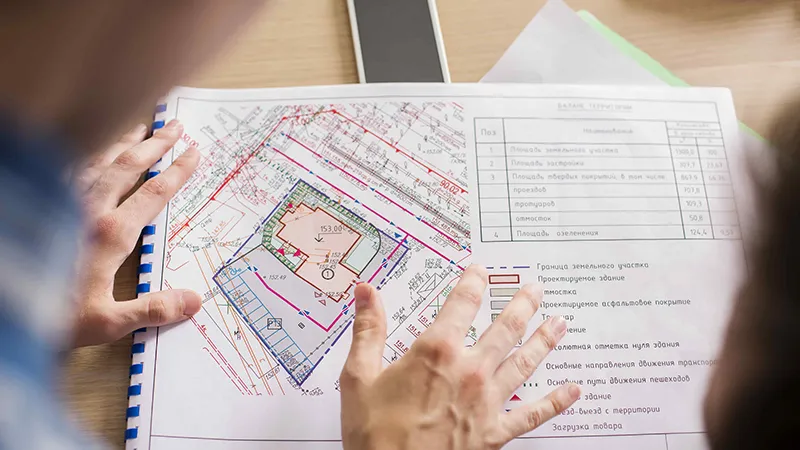When stepping into Turkey's dynamic real estate market, whether you intend to buy, sell, or rent a property, understanding the local terminology is crucial. This knowledge not only helps you transact with greater confidence but also protects you from costly mistakes and potential misunderstandings. Turkey, with its natural beauty, rich culture, and growing economy, is an attractive destination for investment and living. But for a successful property transaction, you need to speak its language. In fact, many experts agree that investing in Turkish real estate is a strategic choice for portfolio diversification and growth
This article, serving as a comprehensive guide, will introduce you to the most important Turkish real estate terms. At istaproperty.com (as part of Estates Istanbul), with years of experience in the Turkish property market and in collaboration with experienced lawyers and expert consultants, we have prepared this guide based on our practical knowledge and expertise to ensure that the information you receive is accurate, reliable, and up-to-date.
Why is Knowing Turkish Real Estate Terminology Essential?
Knowing local terminology in any international market is key to success. In the context of Turkish real estate, this importance doubles:
- Preventing Scams and Costly Mistakes: Familiarity with vocabulary and procedures protects you from falling into the trap of suspicious transactions and financial losses.This knowledge is the first step in avoiding the common mistakes foreign buyers make in Turkey.
- Making Smart Investment Decisions: When you understand the terms, you can better assess a property's true value, hidden costs, and potential return on investment.
- Better Negotiation and Communication: Accurate understanding of terms allows you to communicate more effectively with sellers, real estate agents, and lawyers, and to have a stronger negotiating position.
- Ensuring Compliance with Laws: Especially for those seeking Turkish citizenship through investment, a correct understanding of the laws and documents is vital.
- Understanding Contracts and Legal Documents: Title deeds (Tapu) or sales and rental contracts are filled with legal terms that are difficult to understand without prior familiarity.
Key Turkish Real Estate Terminology (A-to-Z Glossary)
Below, we explain the most important terms related to the Turkish real estate market in alphabetical order:
A
- Aidat (Maintenance Fee/Building Charge): This term refers to the monthly fees paid by residents of apartments or residential complexes for the maintenance of common areas (such as cleaning, security, elevator maintenance, swimming pool, and garden). Importance: Aidat is a fixed monthly cost that must be considered in your living expenses budget, and its amount varies depending on the complex's facilities.
D
- DAB (Döviz Alım Belgesi - Foreign Currency Purchase Document): An essential document for foreigners (including Iranians) who intend to buy property in Turkey. This document proves that the foreign currency required for the property purchase has been converted to Turkish Lira through a bank in Turkey. Importance: This document is mandatory for completing the Tapu transfer process and for applying for Turkish citizenship through investment.
- Daire (Apartment/Flat): A general term for a residential unit in a multi-story building.
- DASK (Doğal Afet Sigortaları Kurumu - Compulsory Earthquake Insurance): Mandatory insurance for all properties in Turkey that covers damages caused by earthquakes and related natural disasters. Importance: Without DASK insurance, many property transactions and even connections to municipal services (water, electricity, gas) are not possible.
- Depozito (Deposit/Rental Security Deposit): An amount paid by the tenant to the landlord at the beginning of a rental agreement as a guarantee. This amount is usually refunded to the tenant after the contract ends, provided there is no damage to the property.
- Döner Sermaye Ödeme (Revolving Fund Payment - Fixed Tax): A fixed and minor tax paid at the Land Registry Office (Tapu Sicil Müdürlüğü) when purchasing property, and its amount varies depending on the property's location.
- Dublex (Duplex Apartment): An apartment located on two separate floors connected by an internal staircase.

E
- Emlak (Real Estate - General Term for Property): This term refers to all immovable assets including land, buildings, apartments, etc.
- Emlakçı (Real Estate Agent): An individual or company that helps you find, buy, sell, or rent a property. Tip: Choosing a reputable and experienced real estate agent, especially for foreigners, is extremely important.
- Ekspertiz Raporu (Appraisal Report / Gayrimenkul Değerleme Raporu): An official document that determines the real and market value of a property by an independent and government-approved appraiser. Importance: This report is mandatory for property purchases by foreigners, especially for Turkish citizenship by investment applications. It is also necessary for tax assessment, mortgage applications, and insurance.
H
- Hisseli Tapu (Shared Title Deed): A document indicating that multiple individuals jointly own a property, but the exact share of each person (e.g., which part of the land or which apartment in a building) is not specified. Note: Purchasing a property with a Hisseli Tapu can be challenging, and it is highly recommended to consult with a specialized lawyer before any transaction.
İ
- İmar Durumu (Zoning Status/Land Use): A document that specifies the legal use of a plot of land (e.g., residential, commercial, agricultural) and building restrictions (such as number of floors, land coverage percentage). Importance: Before purchasing land for construction, checking the "İmar Durumu" is essential to ensure project feasibility.
- İskan (Occupancy Permit/Habitation Certificate): This document indicates that a property (building) has been completed in accordance with local building regulations and standards and is ready for habitation. Importance: İskan is crucial for connecting to municipal services (water, electricity, gas). Without İskan, utility bills might be higher, and you might even face legal issues. Tip: Always check for the existence of İskan before purchasing or get a written guarantee from the developer to obtain it.

K
- Kat İrtifakı (Construction Easement Deed): A type of temporary title deed issued for properties under construction or pre-sale. This document indicates the owner's share of the land and the ongoing project. Importance: Properties with a Kat İrtifakı deed have not yet received İskan. After construction is completed and İskan is obtained, this deed is converted to Kat Mülkiyeti (full title deed).
- Kat Mülkiyeti (Full Title Deed/Apartment Ownership Right): The most complete and secure type of title deed for apartments or independent units within a building. This document indicates definitive ownership of a specific unit and the corresponding share of common areas in the building. Importance: This deed indicates that the property has been completed and has received all necessary permits, including İskan.
- KDV (Katma Değer Vergisi - Value Added Tax): This tax on the added value of goods and services, including real estate transactions in Turkey, is applicable. Its rate varies depending on the type and use of the property.
- Kelepir (Bargain/Below Market Value): A term used to describe a property offered at a price lower than its real or market value.
- Kira (Rent): Meaning the rental or lease of a property.
- Kira Sözleşmesi (Rental Agreement): A formal contract concluded between the landlord and tenant, including all terms and conditions of the lease, rent amount, duration, payment terms, deposit, and responsibilities of the parties.
- Komisyon (Commission Fee): An amount paid as a fee to the real estate agent (from both the buyer and seller or tenant and landlord). This rate is usually legal and includes a specific percentage of the sale or rental price.
- Konut (Residential Property): A general term for types of residential properties such as apartments, houses, villas, etc.
- Müstakil Ev (Detached House): Refers to an independent, non-apartment house, usually with a private yard or garden.
N
- Noter (Notary Public Office): Official offices in Turkey responsible for verifying the authenticity of documents, signatures, and drafting certain contracts (such as preliminary sales agreements). Importance: Some initial steps in property purchase and power of attorney arrangements must be done at a Notary Public office.
S
- Satılık (For Sale): A word commonly used next to property signs to indicate that the property is for sale.
- Satış Sözleşmesi (Sales Contract): An initial contract concluded between the buyer and seller, including details of the terms and conditions of the transaction, price, delivery date, and other agreements. This contract is usually attested at a Notary Public office.
- ● Stüdyo Daire (Studio Apartment): A small apartment unit typically consisting of an open space for living, sleeping, and kitchen, with only a separate bathroom and toilet.

T
- Tapu (Title Deed): The most important and valid ownership document in Turkey. This document, issued by the General Directorate of Land Registry and Cadastre (Tapu ve Kadastro Genel Müdürlüğü), is the official proof of ownership of an immovable property. Importance: Without a Tapu, you are not considered the legal owner of the property.
- Types of Tapu:
- Red Tapu: Issued for residential properties, agricultural lands, and residential lands.
- Blue Tapu: Issued for commercial, industrial properties, and non-residential lands, and includes more details about the permitted use of the property.
- Importance of Tapu Verification (Title Deed Verification): Before purchasing, it is essential to carefully check the details of the Tapu. This check includes:
- Absence of outstanding debts (tax, utility bills).
- Absence of mortgages, judicial seizures, or any other restrictions on the deed.
- Matching property specifications with information recorded in the deed.
- Compliance of land use (İmar Durumu) with the desired property type.
- Review of ownership transfer history (to prevent future legal issues).
- Web-Tapu System: The Turkish government has provided the Web-Tapu system for online access to information regarding title deeds.
- Tip: For a complete and accurate review of the Tapu, be sure to use the assistance of a specialized Turkish lawyer to prevent legal problems.
- Types of Tapu:
- Tapu Harcı (Title Deed Transfer Fee): A tax paid during the transfer of property ownership at the Tapu office. This fee is usually 4% of the sale price of the property and is traditionally split between the buyer and seller, unless otherwise agreed.
- Tapu Sicil Müdürlüğü (Land Registry Office): The government office responsible for registering and maintaining all documents related to real estate and property transactions in Turkey. All ownership transfer processes are carried out in this office.
- TapuTakas: A system for secure and fast exchange of title deeds.
- Triplex (Triplex Apartment): An apartment located on three separate floors.
V
- Vekaletname (Power of Attorney): A formal document prepared at a Notary Public office that allows you to delegate authority to another person (e.g., a lawyer or real estate agent) to conduct specific transactions or legal matters. Importance: For foreign buyers who cannot be physically present at all stages, a Vekaletname is a very useful tool for remote purchases.
- Villa: A large, independent house that typically has a garden and sometimes a private pool.
Y
- Yabancıya Satış (Sale to Foreigners): Refers to the laws and regulations concerning property purchases by foreign nationals in Turkey. These laws include restrictions (such as a maximum of 30 hectares of land and the inability to purchase property in military or strategic areas).
- Yatırım Amaçlı (Investment Property): A property purchased primarily with the aim of generating income (through rent) or profit from future resale.
- YKN (Yabancı Kimlik Numarası - Foreigner Identification Number): A 10-digit identification number issued to foreign nationals residing in Turkey. Importance: This number is vital for all financial and legal transactions in Turkey, including opening a bank account, purchasing property, connecting utilities, and tax matters.
Important Notes for Foreigners in the Property Purchase Process
The following points are universal for a successful property purchase, and are especially critical when buying property in Istanbul due to its dynamic market.
- Documents and Requirements:
- YKN: Essential for all financial and legal transactions.
- Turkish Bank Account: You need to open an account in a Turkish bank to conduct financial transactions and pay expenses.
- Appraisal Report (Ekspertiz Raporu): This report is mandatory for all property purchases by foreigners and determines the actual value of the property.
- DAB (Döviz Alım Belgesi): A certificate of foreign currency conversion to Lira in Turkish banks, which is mandatory for completing the title deed transfer.
- Ownership Transfer Process: All final ownership transfer stages are carried out at the Tapu Sicil Müdürlüğü.
- Importance of a Specialized Lawyer: Hiring an independent lawyer fluent in English and Turkish law is vital for reviewing contracts, title deeds, and ensuring compliance with all legal aspects. Your lawyer can defend your rights at all stages.
- Restrictions for Foreigners: Foreigners can purchase a maximum of 30 hectares of land in Turkey and are not permitted to buy property in military or strategic areas.
- Citizenship by Investment: By purchasing property worth at least $400,000 USD (as of 2024) and holding it for three years, you can apply for Turkish citizenship.
- Additional Costs: In addition to the property purchase price, you should also consider other costs such as Tapu Harcı (title deed transfer tax), Notary Public fees, Komisyon (real estate agent commission), and DASK (earthquake insurance).
- Remote Purchase: By arranging a Vekaletname (power of attorney) at a Notary Public office, you can authorize a trusted person or your lawyer to handle all stages of the property purchase remotely on your behalf.
Conclusion
The Turkish real estate market offers unparalleled opportunities, but understanding local terminology and procedures is your gateway to a secure and successful property transaction. Just like a skilled interpreter bridges two languages and cultures, understanding Turkish property terms transforms you into an informed buyer. This glossary acts as that specialized dictionary, helping you read and comprehend the details of your new life's "sales contract" in clear and understandable language.
At istaproperty.com (Estates Istanbul), with our expertise, integrity, and personalized services, we are always ready to assist you on your real estate journey in Turkey. For personalized consultation and professional guidance, feel free to contact our experts.

 USD
USD
 TRY
TRY
 EUR
EUR
 IRR
IRR
 RUB
RUB

Comments